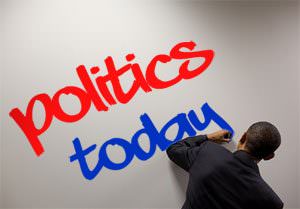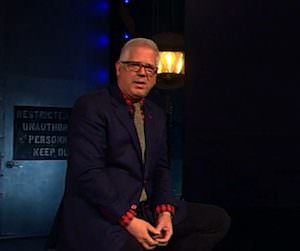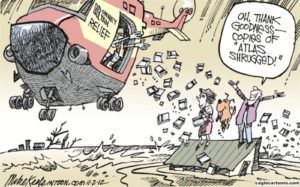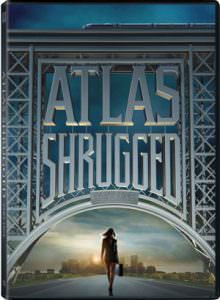Silicon Valley Couldn’t Care Less About Earth’s Imminent Demise
It may be too late to save the planet, warns Bill McKibben, but there's a reason that doesn't seem to keep up our tech barons up at night. :D / Flickr
:D / Flickr
Listen to their full discussion on the environment, gene-editing and other topics related to humanity’s collective suicide. You can also read a transcript of the interview below the media player and find past episodes of “Scheer Intelligence” here.
Robert Scheer: Hi, this is Robert Scheer with another edition of Scheer Intelligence, the somewhat pretentious title for this show. But the intelligence comes from my guests. In this case, no question—Bill McKibben. I could say, arguably, the most important environmental writer in the country. But unquestionably the first person to really bring up the whole issue of climate change. I think we used to call it climate warming or—greenhouse effect—
Bill McKibben: We used to call it the greenhouse effect. I’m so old, that’s what we called it—
RS: Yeah, so that was about 30 years ago, greenhouse effect. You were, what, a kid of 28 or something,
BM: Twenty-eight, mm-hmm.
RS: A Harvard Crimson, you know, smart guy, came out, went to work for the New Yorker.
BM: Went to work for Mr. Shawn at the New Yorker, yeah.
RS: And then you actually quit in protest when he was forced out.
BM: [Laughs] Yeah.
RS: I like that, that’s good that people are willing to give up a cushy job like that. But Bill McKibben has—well, his most famous book, I think, was “The End of Nature.” And I thought it should be “War on Nature,” would be a title. But it’s a subject you revisit in your new book, “Falter: Has the Human Game Begun to Play Itself Out?” And you know, it’s not really a dystopian vision of things, but it certainly raises the possibility of humans being expendable as a presence on the earth. And I want to—you know, there’s a lot to talk about in this book. It’s alarming, and by the way—not just because it’s alarming, because you bring such credibility to it, and such a–and it is extremely well-written, let me just put that out there right now. As somebody who stayed up all night finishing it, I was grateful that it’s so well-written. And it is, as of this coming Sunday of when we’re recording this, a New York Times bestseller. So congratulations; that will ensure that at least some people read it, and that will be helpful. And I just want to begin with the arc of this book. It–OK, it once again lays out a compelling case that we’re really way behind on this question of climate change. It may be hopeless; we may not recover. And then it goes in this odd arc to a question of robots, artificial intelligence, the fantasies of Silicon Valley. And there’s really kind of two sets of problematic, if not demons in this book. One are the libertarians, who informed the old fossil-fuel industry—the Koch brothers and so forth, and Ayn Rand; for those who don’t know her, “The Fountainhead” and “Atlas Shrugged” and so forth. And there you could really talk about a war on nature. I mean, and you quote from “The Fountainhead” and so forth, these compelling scenes about the individual man, who—you know, also seems to be at war with women—but also with nature, and how to control nature. And then we move from that old technology of fossil fuel and the Koch brothers; we move to Silicon Valley, where these people are much more enlightened about current social issues, gender, and so forth. But then they harbor all kinds of fantasies of life without humans, and also bringing back a few important humans who can come up with, what, a couple hundred thousand dollars to freeze their bodies, and so forth. So for me, this book, despite being extremely well-written and obviously you’re a good editor—I was troubled by this arc. So take us through it.
BM: Sure. You know, I was thinking back to when I was writing “The End of Nature,” which as you say was the first book about what we now call climate change. And at the time it was, the book was a warning. Thirty years ago, if you looked carefully, you could tell what was coming. If you talked to the scientists who knew the most about what was going on, it was possible to predict the trouble we were on. But you couldn’t take a picture of it yet; it was still abstract and somewhat distant. I think that the rise of advanced forms of artificial intelligence and of human genetic engineering are also existential threats the way that climate change is. And I think that they’re sort of, right now, where we were with climate change 30 years ago: a place where if you squint, you can tell what’s likely to be coming. And so maybe this time, we might actually think about these things as a society before it was too late, not after.
RS: But I’m trying to understand the fantasy that some super-wealthy person in Silicon Valley might entertain about this. They preserve their body—
BM: Well—take the one that’s most advanced here, human genetic engineering. As you know, in October a Chinese doctor actually produced the first two designer babies that the planet’s ever seen, a pair of twin girls. There’s no mystery about what these guys are planning; they talk about it all the time, the enormous industry that there could be in improving human beings. In producing, allowing you to go into the clinic, as one of these guys after another says—go into the clinic, and with sufficient funds, choose the specs for your new child while they’re in embryo. Tinker with their genes. And I mean, there are obvious practical problems with that. I mean, in a world as unequal as ours, this would obviously etch that inequality into our, you know, very DNA.
RS: You don’t have to cheat on the SATs, you can just redesign the brain to get the perfect score.
BM: Exactly right. It’s the same people who are– [Laughter]
RS: We’re doing this from the University of Southern California, but I didn’t mean to pick on our school.
BM: Well, this is a sensitive subject.
RS: No, because it affected Yale, it affected Stanford, it affected a lot of other places—I think it affected Stanford, I’m not sure.
BM: So that’s part of it. But you know, there’s a much deeper question there. In the end, what worries me is the fragility of very important things. And I think that just as the planet itself turned out to be physically vulnerable in ways that were hard for us to imagine, so human meaning turns out to be vulnerable. Imagine that you’re the child of parents affluent enough to have, say, monkeyed around with your serotonin and dopamine levels when you were in embryo. Which is well within the realm of the possible; not a fantastic idea. And say you reach the age of … you have no idea whether it’s because of something that happened, or because it’s your speck kicking in, you know. And then imagine the kind of things that attend turning people into products. Imagine that you’re a young couple and you go into the clinic and you spend what money you have to get as good a child as you can. And then five years later you’re ready for your second child, and you go back into the clinic, and technology has marched on. And maybe you’ve gotten a little more money anyway, and now you can afford a better set of upgrades. What does that make your first kid? Your first kid is, you know, Windows 2000, the iPhone 6. We–it’s hard for us to imagine that human meaning is something not to be taken for granted, because for the 10,000 years of human history, humans have been largely the same creatures. But it was hard for us to imagine that, you know, we were going to melt half the ice in the Arctic, too, or that we were going to turn the ocean 30% more acidic inside of three decades.
RS: But that’s where I want your help here. And first of all, I’m recommending this book very highly, so I’m not putting it down; it’s—first of all, you have a great sense of humor in this book, which is wonderful to have when somebody’s writing about the possible end of all human life on the planet, and doing so convincingly. You have a great sense of irony, and you know, I don’t know whether—you weren’t at the Harvard Lampoon, you were at the Harvard Crimson, right?
BM: [Laughs]
RS: So you’re a serious person, but you do really make the serious, complex stuff accessible, interesting, so that’s my pitch for the book. However, I want your help in understanding the arc of this book, because I am genuinely confused. On the one hand, we have an image that all life is hanging in the balance, OK. And that we may not be able to do anything about it.
BM: From climate change, yes. Correct.
RS: Yeah, from climate change. On the other hand, we’ve got these very smart people out there–first of all, we have one set of, if not smart, at least successful people, the Koch brothers and others, and what is characterized as libertarians, but mostly the kind of wild followers of Ayn Rand and Mises and von Hayek and so forth, the libertarians. And despite being smart, they’re actually willing to help destroy the planet at a faster rate, and they’ve put a lot of money into elections and things. And so there’s a real important alarm bell sounding here about what’s happened to our democratic process. You quote these people basically saying they don’t believe in democracy, want to destroy the system. So the first half of the book is a compelling argument that these people have put the planet at risk, that they’re irresponsible, they’ve used their money that they’ve gained from exploiting the world’s resources, and they’ve used it to destroy this fragile experiment in representative democracy. So very powerful. Then, we go into your shift from the old industry to the new. And we have these people who believe in artificial intelligence, they believe in—but that part I get. But then they also seem to believe in preserving their bodies so that they can come back. And some of them actually think by the year twenty—was it thirty something?—we may have the means of perpetual life, that we’ll have solved all the medical problems. And I forget, the chief engineer at Google, what’s his name?
BM: Yeah, I’m blocking it at the moment, too.
RS: Oh, OK. [Laughter] But anyway, you quote him compellingly—
BM: Yes, Ray Kurzweil.
RS: Yeah, Kurzweil, and he thinks he’s going to maybe go on forever, you know, and so forth. And yet they’re also contributing to a world in which life may be destroyed. So what do they think, they’re going to come back and live on some other planet that they’ve created?
BM: Well, in fact—
RS: Your book does entertain that. So you know, when I’m reading this—
BM: Funny you should mention that. The one thing all these tech guys have in common is they want to leave. They’re all building rocket ships as fast as they can.
RS: Right. And you spent time with these people in Silicon Valley. And so they’re kind of sanguine, in a way, about the destruction of life on this planet. And you know, aside from everything else, they’re part of the consumer fetish, fetishism that we have in the world, and the waste of resources, and indifference. And you know, sending on the great model of consumption to India and China and everywhere and so forth, so they’re complicit in all this. So–on the other hand, they want to preserve their individual lives [Laughs] and have immortality. So then they have this weird fantasy that they’re going to construct another planet somewhere, another life somewhere, that they will be on. And when you were interviewing these people, these are all very smart people. They also went, like you did, to Harvard, you know. I personally am of the prejudice that Harvard trains crooks for Wall Street and everything else, and has done more to mess up this country than any community college in Kansas. But leaving that aside, these are all bright people, and they present as bright. When you talk to them, and you say isn’t there a disconnect here in your relative indifference to the well-being of life on this planet, and your desire to preserve your own life—what is it going to return to?
BM: Well, I mean, they’re—they’re believers in some kind of techno fantasy world that will, you know, where at least they will be able to survive and prosper. And they’re completely caught up in that world, and not paying much attention to–in fact, they’re abetting it. We learn, you know, with each passing day more about the ways that, say, Google’s tools are being used by the oil industry to find yet more hydrocarbons that we can’t burn. The place–but I think you’re looking for a kind of level of logic that’s not here. You have to look for the emotional logic. What is it that if you’re a tech baron, what is it that you most want? You want to be left alone by the government. That’s been their, that’s been their cry from the beginning. And you know, I mean, what did Mark Zuckerberg say when he started Facebook? “We’re going to move fast and break things.” And boy, have they!
RS: He also said about privacy, “Get over it.”
BM: Yeah. So they don’t want–what they and the Koch brothers don’t want is society—they don’t want the rest of us in their way. They want to do what they want to do. And we live in a world, unfortunately, where in the crucial 30 or 40 years, that view kind of won out. Beginning with Reagan, the view that government was the problem, not the solution; beginning with Maggie Thatcher, declaring that there is no such thing as society, there are only individuals. You know, that worldview would have been a problem at any time, but it’s a tragedy at the moment when we desperately needed government to step in and do something about climate change. It’s a tragedy at the moment when we desperately need regulation of the tech industry. And instead we’re being left, because of this incredibly powerful ideology—I mean, we’re seeing the pushback, finally, against it now. That’s why Bernie Sanders is the most popular politician in America, you know. That’s why, finally, the Democrats are beginning to show some mild signs of resistance in life, you know. That’s because people are waking up to these things. I worry that we may have waited too long; at least with climate change, we lost what may have been the crucial three decades.
RS: Well, I was going to wait until after our break to push back a little bit on this. But let me just begin it now. The villains, certainly in the first part of your book, are the libertarians. In your book. And I resist that. First of all, it’s like anti-communism or anti-socialism or anti-Semitism or anything—any scapegoating, any simplistic characterization of a whole ideology. Which, you know, I mean, there are—the Electronic Frontier Foundation is one of my favorite organizations, because I’ve written about privacy. And they are basically libertarians, but they actually believe in smaller government [Laughs]. As you quote Adam Smith favorably in your book, if you really believe in a free market, you don’t believe in these big cartels and monopolies. And the big contradiction is, yes, we should regulate Silicon Valley, just as we should regulate the fossil fuel industry. But that was believed by, you know, the Founders of the country, for goodness’ sake. I mean, power corrupts, and absolute power corrupts absolutely. My only—it’s very funny, because for people who don’t understand the sort of history of the libertarian philosophy, I remember as a kid at City College in New York where you had an alcove for every ideology. So you had three different variants of Trotskyists, or Stalinists, or this or that. But you had a libertarian corner, and they were all reading, you know, Ayn Rand and von Mises; this was very much a product of the ’50s. And the hero of the male entrepreneur and so forth. And what you point out in your book is, that was not kidding around. That was the big model, and the big—I really had underestimated it in that respect, until I read your book. I mean—and you had people like Alan Greenspan, who did a lot to design our economy, or Bob Moses, who did a lot to destroy New York City as a wonderful place with his highways and freeways. These people—and they did influence people like Thatcher and Ronald Reagan, and the whole idea of government is the problem, not the solution, and so forth—very dangerous. And the real power of this book is to say, hey, we can’t afford this game anymore. You know, you got to really be able to make decisions on a governmental level in China, India, and here, and we got to stop kidding around. The pushback for me is, you sort of give the Democrats and neoliberalism a kind of blank check here.
BM: I just think they’re just kind of, they were supine; that they got, that Reagan set the agenda and really no one has broken out of that mold until—until right now.
RS: [omission for station break] The book is called “Falter”—you know, I don’t love the title, but I’m glad that it’s on the bestseller list, despite what I thought was an inadequate title [Laughter]—“Falter: Has the Human Game Begun to Play Itself Out?” And the reason I say that is, you’re not saying we’re faltering; you’re saying we’re about to go over the cliff. And it’s a pretty grim view, and unfortunately, seems to be a well-documented, accurate, knowledgeable, authoritative book; I mean, this is not a book—you will lose sleep over this book. And rightfully so. But let me push back on the villains here. Because, you know, I think there is a—and you have the libertarians coming up not only with the old fossil-fuel industry, but also obviously in Silicon Valley. And it’s true of any billionaire these days; they’re all going to take Ayn Rand’s argument and justify their greed and corruption and not paying enough taxes and everything else. Because, yes, you know, let the pygmies of government get out of my way and I will create wonders, and it’s a compelling, opportunistic argument. I also believe there are a lot of—just as I believe there are a lot of, there were a lot of sincere socialists, communists, vegetarians, you know, Christians. Lots of people get caught up in these big-idea movements because there’s some principle there. And I do think the pushback against big government, and the respect for privacy and individualism, is valid—as you indicate in your book; I’m not telling you something you don’t know. But it hit me particularly around–and I’m going to go back to my point about the Clintonistas. Because you single out Alan Greenspan, and Alan Greenspan was in the living room with Ayn Rand, and so forth. And you know, the Koch brothers make an easy target, you know; and actually, by the way, as far as pushback, I don’t think we needed to know that his nanny checked his bowel movement, the German nanny. I know it can give an insight, but—but—
BM: It was from Jane Mayer’s wonderful, wonderful book, “Dark Money,” which I highly recommend.
RS: [Laughs] I know. And OK, I’m just saying—
BM: I thought it was interesting that their nanny, of the Koch brothers—left, left the service of the family to return to Germany when Hitler was elected because she was so happy to go back to the Führer.
RS: Right, OK. As I say, this is pushback, and I think that’s a stretch to somehow connect—and also, there were four Koch brothers, and two went in a different direction somewhat. So they probably had their stools checked by the same nanny. Or maybe they didn’t, maybe she left earlier. But leaving that aside [Laughs]—and I know, there isn’t much inclination to be kind toward the Koch brothers, and so forth. But I do want to say, so Alan Greenspan was caught up in this libertarian ideology, which is very easy to understand if you’re going to be, put yourself at the service of Wall Street and big business that says don’t regulate, let them do their magic and so forth. The opportunism was very obvious. But it wasn’t Ronald Reagan who unleashed Wall Street, it was Bill Clinton and the reversal of Glass-Steagall, you know, the freeing of the banking–I’m not telling you something you don’t know. Reagan actually, because of the Savings & Loan scandal, tightened some banking regulations at the end. It remained for these neoliberals—and yes, it’s nice to mention Bernie Sanders, but he’s not the Democratic Party, and he got wiped out by these people last time.
BM: I think—if you’ll remember, it was Bill Clinton who put Alan Greenspan in for yet another fateful term as head of the Federal Reserve.
RS: Exactly my point, sir, yes.
BM: I’m just saying that this, that to me the key political development of my lifetime was Ronald Reagan’s election. I think that’s what–and I think that Bill Clinton and others just were kind of in the echo of that big bang. And they couldn’t–I mean, in fact, if you think about it, Bill Clinton finished– Reagan, there were things Reagan couldn’t do because the Democrats at that point were still in the way. He could–you know, Reagan couldn’t have gotten the General Agreement on Tariffs and Trade through; he probably couldn’t have ended welfare as we know it, the way that Clinton did. Clinton brought the Democrats along; he was looking for that third, middle way, whatever he called it. But basically, it was a continuation, and very sad. And that’s why it’s good to see the reaction that’s happening now; that’s why it’s good to see Elizabeth Warren and, you know, all kinds of people making the strong, concentrated case that we need to go in a very different direction. I’m just not sure that we’ve waited too long.
RS: But you also have former Vice President Biden, who was very much a part of this neoliberal, Clintonista phenomena, and—
BM: It’s a fascinating tussle, watching it play out now.
RS: OK, but because I respect—I’m not blowing smoke here, I respect you so much. And particularly in this all—all, I mean, huge, compelling area of what we’re going to do to save the planet. And I don’t trust these people, because you know, yes, Alan Greenspan did this and this. But Lawrence Summers, who went on to be head of Harvard, and Robert Rubin, who went to work at Citibank–
BM: You’re not going to find me defending him, I’ve taken on Mr. Summers a good deal over the years.
RS: I know, but I’m just—I’m just, in my A+ review of this book [Laughter]—and for people who are going to go out and buy it now, and hopefully they will, and I’m thrilled that it’s on the bestseller list—I just want to, you know, that’s my job here—
BM: I hear you, absolutely.
RS: You know, go a little bit further. And because, you know, ending welfare—and this fits into the theme of your book. I mean, you know, what we have to be concerned about is giving people a way to live in this world and breathe clean air and so forth. And yet, you know, not have to be assembling iPhones at miserable wages and so forth.
BM: I just want to say, a very good thing that’s happening right now that unites all these questions is what’s going on with the Green New Deal. Because in its attempt to deal with the absolute have-to-deal-with-it physical problem of climate change, it’s talking about much of the kind of political and social reconstruction that you’re talking about. You know, it’s talking about a federal job guarantee; it’s talking about medical care; it’s talking about free college education. Because it understands those as necessary parts of the enormous work, sort of World War II-scale work, that will have to be done to deal with the climate crisis.
RS: Right. And that’s why Bill Clinton’s destruction of the federal poverty program, what’s called welfare reform—which was a fraud from day one when he was governor in Arkansas and he had projects, I’ve discussed that on this show, I don’t want to visit it here. But you know, I’m all for bashing [Laughs] the big corporate libertarians who misuse Adam Smith, and basically defend monopoly capitalism of an extreme kind, rather than really the free market. That’s true of these neoliberals who in fact, you know, champion big government for the super-rich, is really what it is, and screw ordinary people. And I want to bring you to a very important subject in your book relating to climate change, and that’s trade and so forth. And again, if I want to push back a little bit on your book, it’s a bit, to my mind, America-centric. In that, yes, you travel all over the world and you care a lot about Africa, you care a lot about China, you care—you have a world vision, I’m not denying that. But the fact of the matter is, in a country like China or India, they’re really talking about catching up to what we were able to exploit. And then the question is, how can we convince them, how can the world–how can they convince their own people? Because after all, if they can’t deliver in the short run, they’re not going to be around for the long run. And the question is, like with these, I want to just bring up a couple of examples from trade. And you point out correctly in your book that it was Bill Clinton who pushed through NAFTA, right? And you know, the fact is, Donald Trump, whatever we think about him, his rewrite of NAFTA actually puts in a few things there, like a guarantee for people assembling cars in Mexico that are going to be imported duty-free have a $16 wage, and for 45%, that local courts have some control in Canada and the U.S. and in Mexico, and not just corporate-controlled courts, and so forth. So I’m not saying he’s changed the whole thing, but at least finally we have a trade agreement that worries a little bit about the condition of workers. And I want to pick up one, two elements that, we’re going to run out of time, but they’re really critical. One is, it seems to me the big push–because you talk a lot about solar, electric, and that’s all great. But I think the ball game in some ways might be decided by what China is right now doing to try to breathe—as you point out, you can’t breathe—with electric cars, and so forth. And yes, the Trump administration is pulling back on that. I happen to have a Chevy Bolt, I love it, but you can’t go up the 5 here in California and find a place to charge your car, by the way. Even though under Jerry Brown we all were for it, and there were subsidies, but it’s not usable except if you go off on the side roads and take more time. And so China, you know, in these trade agreements—we’re not pushing for understanding why they want to get to a different kind of economy. And India. So that’s one big factor. The other I want to bring up is the controversy you refer to just in a few sentences in your book, of nuclear power. And you mention, and you’ve mentioned in the past, if you get into nuclear power you split the environmental movement in half. And I personally share a lot of the hostility towards the use of nuclear power; I obviously care a lot about the arms race, and so forth. I was in Chernobyl; I think I was the first print reporter, from the United States certainly, in Chernobyl; frightens the hell out of me. But I really wonder, in this bleak world that you’re describing, whether we need to have a serious discussion about the peaceful use of nuclear power.
BM: So this actually, in some ways, goes to both these questions. I actually don’t think it would split the environmental movement. I don’t think the environmental movement’s paying that much attention to nuclear power. I don’t think—and I think the biggest reason for that is, no one’s going to build these things because they’re insanely expensive. You might as well burn $20 bills to generate electricity. A different question is whether we should move fast to try and shut down the ones that still remain in this country. The ones that are already built and paid for, or the Union of Concerned Scientists is saying, maybe let them stay open, as long as we can try and keep them safe for a while, while we’re making this transition. The good news is–and this goes to China and India–the price, the engineers have really done an excellent job. The price of a solar panel has dropped 90 percent in the last decade. It’s now by far the cheapest way to generate electrons around most of the world. So China is quickly retooling, partly because of their smog–they’re putting up renewable energy at a pace we’ve never seen before. The most interesting question, really, is India, which is where China was in terms of energy 15, 20 years ago. It’s beginning to look like India may try to kind of make its great push forward as the first country that really leapfrogs fossil fuel and relies heavily on renewables, just because of the cost. You can generate electricity more cheaply in India, far more cheaply, now with new solar than you can by building coal-fired power plants. It doesn’t mean that the power of the fossil-fuel industry isn’t strong, that they’re not going to try and–in fact, they’re going to lose. I mean, 50 years from now we’re going to power the whole world on sun and wind because it’s free. The question is, what kind of world will it be? And if we make that transition quickly, we’ll still have some world left; if we go at our current pace, we’re going to be powering a broken world with solar panels and wind turbines.
RS: And by the way, I—it’s good to end on an optimistic note here. And I love the section in your book where you discuss Arizona and solar. And you point out, this is a state where its athletics teams are named, you know, the Sun Devils, and you know, the Phoenix Suns—
BM: Phoenix Suns, yes.
RS: —and everything. And yet—and it’s the most obvious place to fuel a whole society on sun, what could be better than Arizona. And yet there was actually pushback from—OK, here, let me say it—these bad [Laughs] Koch brothers and others. And you know, who did–and one—oh, I’m tired of quibbles with your book. [Laughter] But you do mention the ‘18 election, and the fact is, they did lose the House, even though they put a lot of money into it. But I do want to, let me finally put it back to China. I’ve always had a little bit of problem with environmentalists. Because, again, sometimes it seems—like, OK, we had our run, and now the rest of the world can’t have it. And I remember as a much younger person in the early sixties, being a fellow in the Center for Chinese Studies at the University of California. And we had, Franz Sherman was a great leader, and so forth. And half the operation was very good academically, and then below us there was the CIA evaluating all the stuff from China. And that’s when Paul Ehrlich came out with his “Population Bomb.” And the whole argument was, you know, we really have to stop the Chinese from having babies, and I guess the people in India. That’s the real problem in the world, now that we’ve had ours, and so forth. And I felt, you know, well, that’s pretty narrow-minded, unless you give them something else, you know. And the irony is that China then had somewhere between four and 500 million people; it now has closer to 1.4 billion people, so it’s put about another 900 million people on the earth. And there’s no question that those people are living better than the original population did. Now, there’s a cost, a big cost. What I’m saying is, and I feel this should be your next book, kind of a “Listen, Yankee!”-type book, taking C. Wright Mills’ old title. And say, yes, all of this discussion and concern is well and good, but if we don’t bend trade rules, if we don’t understand this is a global economy–and this goes to your friends at Silicon Valley, or the people you interviewed. And the real question there is, why aren’t they paying 16 bucks an hour? If we can now ask in Mexico that they pay 16. And you know, why aren’t we—through what we’re willing to pay for these iPhones and everything else–supporting an economy in which people can maybe move to alternative energy, maybe have a shorter work week, and so forth? It seems to me the big challenge—and the reason I’m putting, this is my last question I’m putting to you—but you’ve been a moral force in this country for, you know, 30-odd years or so, more so. And it seems to me what well-intentioned liberal folks seem to miss is a little bit of nimbyism here. You know, hey—what you’re doing over there, aside from the fact that you can’t breathe, is messing up our planet. You know, and I think it has to come with: And we are willing to make sacrifices commensurate with what we’re expecting you to make.
BM: Well, that’s—I mean, you know, I’ve helped start 350.org, which has been the first global climate movement. We work in 181 countries, and it’s people in those countries that do the work. And climate change is the perfect place to be thinking about this, because there’s no way—I mean, they don’t call it global warming for nothing. There’s no way to solve it without everybody playing some role. In fact, the iron law of climate change is, the less you did to cause it, the more you suffer. So that’s in whose interest it is, above all, to figure out how to get everybody off fossil fuel. That’s what we work for all over the planet. So as I say, I’m optimistic about everything except the timing. And my sense of urgency, the reason that I end up in handcuffs a lot and so on, is because we’re moving much too [slowly] …
RS: You know, there are subjects that are visited frequently, you know, and people bring it up all the time. What your book does—and I have to keep stressing the element of humor in it—it’s really, it’s not a scold. It’s a book that says, you know, damn it, this is the ballgame. It’s real. But let’s not, you know, think we have all the answers; let’s not think everything we’ve done is right. There are contradictions. But you know, we can get this right. And you know, I hope the human game has not begun to play itself out, because I kind of like this world.
BM: Me too.
RS: OK, you too.
BM: And I want to just say, thank you to you. It’s a pleasure to be closely read by someone with a sense of history. So thank you.
RS: Thank you. All right, and let’s thank our engineers, Kat Yore and Mario Diaz over at KCRW in Santa Monica. Joshua Scheer is the producer of this program. And here at USC, which I took a cheap shot at, but only to say our issues are no different than Yale or the other great universities—
BM: Maybe even Harvard. [Laughter]
RS: Well, I was going to say about Harvard, they don’t have to cheat it, they just bring in their rich people and have been doing it under legacy admission forever. So no, it wouldn’t be “even” Harvard; Harvard’s a major offender. And here at USC, where Victor Figueroa has been our engineer, and of course the Annenberg School has once again made these facilities available to us, and we thank them very much. See you next week with another edition of Scheer Intelligence.
Your support matters…
Independent journalism is under threat and overshadowed by heavily funded mainstream media.
You can help level the playing field. Become a member.
Your tax-deductible contribution keeps us digging beneath the headlines to give you thought-provoking, investigative reporting and analysis that unearths what's really happening- without compromise.
Give today to support our courageous, independent journalists.






You need to be a supporter to comment.
There are currently no responses to this article.
Be the first to respond.